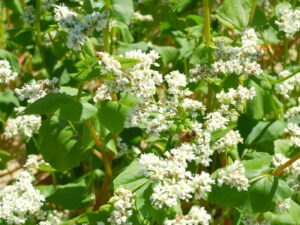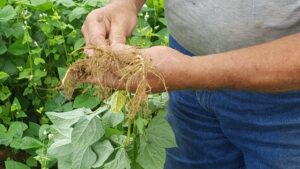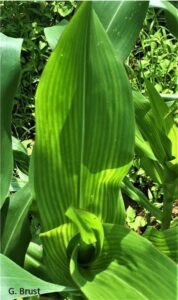 Now that some of our spring planted crops have finished, rather than leaving fields fallow or replanting fields that may have had some issues with plant diseases or insect pests, consider replanting with a summer cover crop. It is not too late to take advantage of summer cover crop benefits. What do summer cover crops do for soil health or future crop improvements? See below:
Now that some of our spring planted crops have finished, rather than leaving fields fallow or replanting fields that may have had some issues with plant diseases or insect pests, consider replanting with a summer cover crop. It is not too late to take advantage of summer cover crop benefits. What do summer cover crops do for soil health or future crop improvements? See below:
1. Increase Soil Organic Matter– One of the best attributes of having organic matter in the soil is improvement in soil structure. Adding organic matter improves tilth, water infiltration, water holding capacity, nutrient holding capacity and reduction of soil crusting. Also, as important is the increase in beneficial soil microbes and earthworms. Beneficial microbes can compete with pathogens and help release nutrients. Earthworms can cycle nutrients and improve pore spaces in the soil.
2. Reduce Soil Erosion – Just like with winter cover crops, summer cover crops can also reduce wind and water erosion in fields, especially those with slopes. During summer rainfall events, that can be significant if resulting from tropical storms, runoff may not just include soil loss, but also fertilizer and chemical movement. Therefore, keeping cover on a field during non-production times in any season is an excellent practice.
3. Nitrogen Cycling in the Soil – Nitrogen is often the most limiting nutrient for crop production, since it is so readily lost through nitrification and leaching. Storing nitrogen through plant cycling is an excellent way to improve fertility management. Whether it is a grass or non-leguminous cover crops N is still kept in the mix by the cover crop taking up residual N that would otherwise be lost. The cover crop plant takes up the nitrogen and after the crop is incorporated it decomposes, thus releasing the N for subsequent crops to use. If legume cover crops are planted, they have the ability to “fix” nitrogen from the atmosphere and through the same decomposition process will provide N for subsequent crops. Be sure to inoculate legume seed just prior to planting with Rhizobium bacteria in order to gain the maximum N fixation benefits.
otherwise be lost. The cover crop plant takes up the nitrogen and after the crop is incorporated it decomposes, thus releasing the N for subsequent crops to use. If legume cover crops are planted, they have the ability to “fix” nitrogen from the atmosphere and through the same decomposition process will provide N for subsequent crops. Be sure to inoculate legume seed just prior to planting with Rhizobium bacteria in order to gain the maximum N fixation benefits.
4. Reduce Weeds – When fields are left fallow after crops are harvested, weed growth can occur. If left to produce seeds, these weeds will multiply in subsequent crops. Therefore, managing the field by planting cover crops between cash crops is a great weed management option. As the cover crop grows, it will suppress the germination and growth of weeds through competition and shading. Some cover crop species can also suppress weeds biochemically, either while they are growing or while they are decomposing, which may prevent the germination or growth of other plants (allelopathy). Research has shown some cover crops like wheat, barley, oats, rye, sorghum, and sudangrass may suppress weeds. In some cases, it has also been reported that residues and leachates from crimson clover, hairy vetch, and other legumes have shown weed suppression.
5. Impacts on Plant Diseases – Cover crop residues could possibly be beneficial when it comes to plant pathogens, or can in some cases increase plant disease organisms. Some cover crop species are in the same plant families as cash crops and may be susceptible to the same disease organisms. Therefore, carrying the pathogen to the next crop. This is why paying attention to crop rotations is so important. In other cases, the cover crop residue can improve soil health in order to produce a better environment for beneficial microbes. By improving soil health, water infiltration, air pore space and other positive attributes, some soil pathogens may not survive as well, as in the case of water molds and water fungi. Some cover crops, like sorghum-sudangrass and sunnhemp, have been reported to reduce nematodes in soils. There are multiple positive factors from cover crops that can combat plant diseases.
6. Impacts on Insects – Like with plant diseases, cover crops can be susceptible to the same insect pests as cash crops. However, they may also attract beneficial insects into an area. Insect pests should be monitored in cover crops, just like in cash crops in order to not let populations get out of control and then move into nearby fields after the cover crop is killed.
For more resources on the us e of cover crops check out these resources: Cover Crops for Sustainable Crop Rotations – SARE

